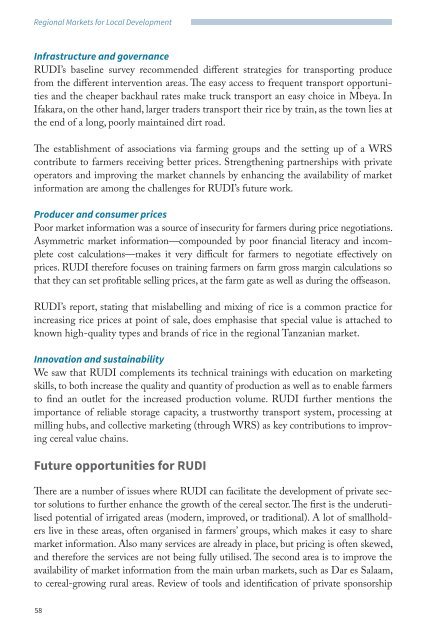Regional Markets
56ec00c44c641_local-markets-book_complete_LR
56ec00c44c641_local-markets-book_complete_LR
Create successful ePaper yourself
Turn your PDF publications into a flip-book with our unique Google optimized e-Paper software.
<strong>Regional</strong> <strong>Markets</strong> for Local Development<br />
Infrastructure and governance<br />
RUDI’s baseline survey recommended different strategies for transporting produce<br />
from the different intervention areas. The easy access to frequent transport opportunities<br />
and the cheaper backhaul rates make truck transport an easy choice in Mbeya. In<br />
Ifakara, on the other hand, larger traders transport their rice by train, as the town lies at<br />
the end of a long, poorly maintained dirt road.<br />
The establishment of associations via farming groups and the setting up of a WRS<br />
contribute to farmers receiving better prices. Strengthening partnerships with private<br />
operators and improving the market channels by enhancing the availability of market<br />
information are among the challenges for RUDI’s future work.<br />
Producer and consumer prices<br />
Poor market information was a source of insecurity for farmers during price negotiations.<br />
Asymmetric market information—compounded by poor financial literacy and incomplete<br />
cost calculations—makes it very difficult for farmers to negotiate effectively on<br />
prices. RUDI therefore focuses on training farmers on farm gross margin calculations so<br />
that they can set profitable selling prices, at the farm gate as well as during the offseason.<br />
RUDI’s report, stating that mislabelling and mixing of rice is a common practice for<br />
increasing rice prices at point of sale, does emphasise that special value is attached to<br />
known high-quality types and brands of rice in the regional Tanzanian market.<br />
Innovation and sustainability<br />
We saw that RUDI complements its technical trainings with education on marketing<br />
skills, to both increase the quality and quantity of production as well as to enable farmers<br />
to find an outlet for the increased production volume. RUDI further mentions the<br />
importance of reliable storage capacity, a trustworthy transport system, processing at<br />
milling hubs, and collective marketing (through WRS) as key contributions to improving<br />
cereal value chains.<br />
Future opportunities for RUDI<br />
There are a number of issues where RUDI can facilitate the development of private sector<br />
solutions to further enhance the growth of the cereal sector. The first is the underutilised<br />
potential of irrigated areas (modern, improved, or traditional). A lot of smallholders<br />
live in these areas, often organised in farmers’ groups, which makes it easy to share<br />
market information. Also many services are already in place, but pricing is often skewed,<br />
and therefore the services are not being fully utilised. The second area is to improve the<br />
availability of market information from the main urban markets, such as Dar es Salaam,<br />
to cereal-growing rural areas. Review of tools and identification of private sponsorship<br />
58


